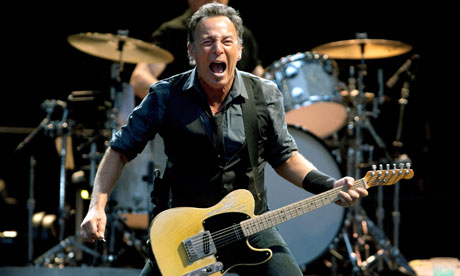
In these uncertain times who can we look to for guidance on how to end the recession? The economists can't make up their minds and the political leaders seem out of their depth: is it time to call for The Boss? That's the conclusion reached by Australia's treasurer Wayne Swan, who has suggested the answer to the economic crisis could lie in following policies based on the lyrics of Bruce Springsteen. Swan revealed he liked to play Born to Run after giving the government's budget speech – not something one can easily imagine George Osborne doing. The Australian politician has been predictably attacked by critics. "It says everything about this government that it is guided by the principles of a rock singer," sneered Joe Hockey, a political opponent. Personally, I think Swan is on to something.
By coincidence he made his speech just as Springsteen concluded his European tour and I began a three-week run of my one-man show at the Edinburgh Festival. It is called The Boss Rules and its premise is that the road to a fulfilled life lies in applying lessons gleaned from the lyrics of Bruce Springsteen. In the comedy show, I take the audience on a jaunt through my life and demonstrate how at key moments Springsteen's lyrics helped me: Thunder Road showed me the way out of Luton, Prove it all Night gave me the courage to turn my back on an arranged marriage and so on. Like Swan, I also believe there isn't an answer in life that cannot be solved through Springsteen, and in the show I challenge the audience to tweet or tell me their dilemmas, which I attempt to solve using Springsteen songs.
When I first stumbled on to his music 25 years ago, being a Springsteen fan was desperately unfashionable. Now he is almost beyond any serious criticism. This week's New Yorker features an epic 15,000-word Springsteen profile written by its editor David Remnick. "The Springsteen generation", as Swan calls it, is now in power in media and politics, a fact not without irony: an artist whose songs chronicle the lives of the marginalised powerless is now lionised by the mainstream elite.
There is a story about when John Steinbeck first heard Woody Guthrie's song Tom Joad which was based on Steinbeck's The Grapes of Wrath. "You little bastard," Steinbeck wrote in a letter to the folk singer, "how could you say in a few verses what it took me an entire novel to say?" Guthrie's gift is also Springsteen's talent – the ability to compress big thoughts into a small number of words and to articulate the hopes and inspire the dreams of ordinary people. Springsteen has arguably been more successful in that than most political leaders which is why so many of us turn to his words in times of doubt and darkness. It was Mike Appel, Springsteen's first manager, who back in the early 1970s said that "Bruce Springsteen isn't a rock act – he's a religion." At the time it sounded like empty bluster, today, not so much.

